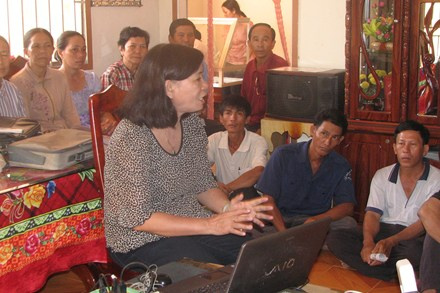The 'eco-farmer' won the Kovalevskaia prize
There was a woman who was anxious to find a way to protect the rice but did not use chemical toxins and she succeeded. With this dedication to the Western field, she was honored to receive the Kovalevskaia Prize in 2011 and many other prestigious awards.
In order for the Mekong Delta to become a granary of the country, farmers in the Western region must use tens of thousands of tons of chemicals except pests every year. Some of them are residues in the environment, affecting public health.
Haunt: Scoop water under the canal to drink .
In the early days of December 2012, in TP.My Tho (Tien Giang) took place the MDEC Forum - Tien Giang 2012, which honored and discussed 'Towards a quality and sustainable agriculture' , with a female doctor (TS) came to the hamlets in Cai Lay district, Go Cong Tay district (Tien Giang) to guide farmers to 'clean' and sustainable production methods. That is Dr. Nguyen Thi Loc - Head of the Department of Insect Ecology and Biological Prevention - Mekong Delta Rice Institute.
Born and raised in a peasant family in Quoc Oai district (old Ha Tay), love with rice is available in the blood of girl Nguyen Thi Loc. Graduated from Hanoi Agricultural University No. 1 in 1980, the school retained as a lecturer, but young engineer Nguyen Thi Loc volunteered to work in the Mekong Delta, the land always has her attraction. The young engineer came to work at the Mekong Delta Rice Institute located on a canal bank in O Mon - Can Tho district.

Dr. Loc instructs how to use Ometar inoculants for farmers.
Every day, see the beautiful rural women in the village and tenderly carry water from the canal, make a living, eat the family, engineer Loc is very afraid, because she knows that a large amount of pesticides are not residual. Rice fields withdrew into canals. It was the first motivation to motivate engineer Loc to study methods to help farmers reduce the use of chemical drugs, to help the environment less polluted. The great opportunity came when in 1995, engineer Loc was allowed to study masters in India with the topic 'Exploiting the biological control potential of white fungus, Beauveria bassiana for rice pests' in Truong Dai Agriculture and Engineering Pantnagar (India).
Pesticides are harmless to people and the environment
Once, after completing a master's degree in India, when passing the rice fields to stay at the library in the Mekong Delta Rice Institute, accidentally, Mr. Loc discovered in a rice field that had some pests. died. She took the corpses to study the agents that killed them. She recorded some fungal parasites on the psyllid, which was also the topic of her doctoral thesis at Durham University (England) later.
Returning to the country, Dr. Loc immediately began to build the process of producing biological products except pests instead of pesticides. After many years of research, Dr. Loc and colleagues successfully produced two probiotics of green fungus and white fungi except pests; has been included in the list of pesticides with the name Ometar and Biovip to prevent brown plant hoppers, rice stink bugs and coconut beetles. These preparations are completely harmless to users, to the ecosystem and to the environment. Dr. Loc carried out the project: 'Rapid production process of Ometar bio-pesticide product on household scale'.
With this process, farmers can completely produce biological products to kill hoppers from simple, cheap materials such as plates, spawn . With practical contributions to farmers, only In a short time, Dr. Loc was honored to receive many prestigious awards: Kovalevskaia Prize 2010; APEC - America 2011 Innovation Award; WIPO Award (World Intellectual Property Organization) 2011; Second prize of Vietnam Science and Technology 2011.
With 3,000 USD of Kovalevskaia 2011 prize and other funding sources, Dr. Loc continues to study green mushroom preparations to prevent pests harmful to vegetables and fruit trees. Initially she studied and transferred 5 'safe vegetable growing' processes to 5 common vegetables in concentrated vegetable growing areas in the Mekong Delta. The research and application of Dr. Loc in addition to contributing to increasing economic efficiency in agricultural production, also creates a safe food source, protecting public health and ecological environment. And the ultimate goal is a quality, sustainable agriculture!
- Awarding Kovalevskaia Prize 2011 to 2 female scientists
- Awarding Kovalevskaia Prize 2014 to Vietnamese female scientists
- Research on technology to treat eye eyeball lesions reaching Kovalevskaia award
- Nobel Prize: Glory, bitter and things ...
- Japanese-English writer Kazuo Ishiguro won the 2017 Nobel Prize for Literature
- Story of a 'farmer's farmer'
- Nobel history and things to know
- Determine the date of the 2013 Nobel Prize
- Ig Nobel 2013: Applause is breaking the law to win peace
- Nobel Prize - a million dollar prize and a century journey
- The Nobel Prize is not in the Nobel's 'vision'
- Nobel literature - unpredictable prize
 The most famous scientific failures in history
The most famous scientific failures in history Mysterious genius mechanic and the machine froze time
Mysterious genius mechanic and the machine froze time The son carries the 'bad gene' of genius Albert Einstein
The son carries the 'bad gene' of genius Albert Einstein Isaac Newton
Isaac Newton